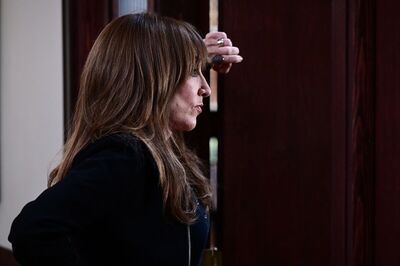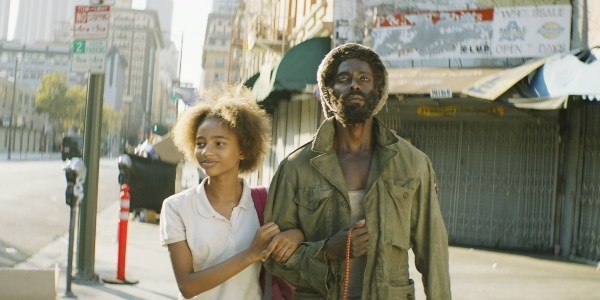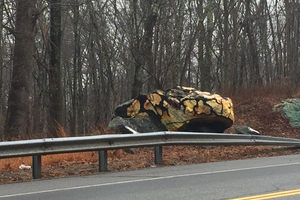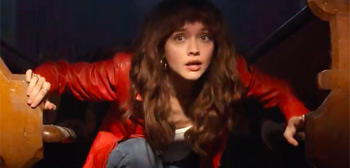Berlinale 2021: Writer And Director Fred Baillif On THE FAM (LA MIF)
This year’s winner of the Generation 14plus Grand Prix, the top prize at the youth category at the Berlinale, The Fam (La Mif) is equally haunting and fascinating. The insight into a care home for young girls discusses delicate subjects such as incest and sexual abuse with a verité approach that feels all too real, courtesy of director Fred Baillif’s previous experience as a social worker. For two years, Baillif worked on building a bond with not only the young women under care, but with the professionals around them, ensuring everyone involved in the process was not only comfortable with exploring such heavy subjects but also safe when doing so.
Fred Baillif sat down with Film Inquiry to discuss his unusual casting, the poignant moments shared with cast and crew, and the highs and lows of taking part in a digital festival.
Rafaela Sales Ross for Film Inquiry: You worked with non-actors, young women you have encountered through your own experience as a social worker. Out of all the people you had access to, how did you end up selecting the group that stars in the film?
Fred Baillif: In the beginning, I went to a foster home because I wanted an arena where I could talk about these issues, incest, sex abuse, things I didn’t know how to approach and I thought this would be a good way to do it. I was happy to work with anybody, but the girls I met in this place were amazing and I decided to work with all of them. There were just two girls who were minors and I was really sad actually that they couldn’t be a part of the project because they didn’t have authorization. It actually gave me a lot of inspiration for the film because sometimes I think overprotection can also be destructive and, you know, I was really upset these two girls couldn’t participate with the others. The other girls were overage and were allowed to participate and there was, of course, Claudia, who used to be the director of the place and now is retired. I really wanted her to play this role because I’ve known her for a long time and I knew she would be good. I was surprised at how amazing she is in the film.
It’s a whole process, you know, to teach them not to act, to just be themselves and go with the flow. Whatever happens. Be okay with being surprised by what I bring to the story and all that, so it’s a really long process to build their confidence so they can really enjoy being in the film like a real actor.
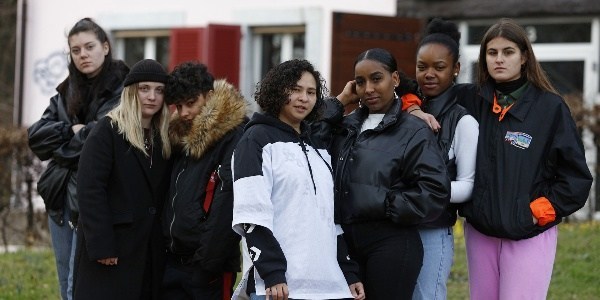
Did you provide any psychological support to the girls? Did you have anyone on set with them? Because they were prodding very deep wounds and these are difficult subjects to discuss, especially when one realises they are not actors and they have actually been through trauma themselves.
Fred Baillif: We were all there supporting them the whole time, the whole crew and Claudia, who had known them for a long time. Also, the social workers are real social workers, so every time we had a feeling that something wasn’t easy we always took the time to stop the shoot and talk, to listen to what they were feeling. But, you know, there was a deal from the beginning between us that nothing from their real-life could be in the film. They are really playing a role. It was a real deal unless they really wanted to bring something from their personal life to their character – I was okay with that but it had to be their choice, they would never be forced or pushed in that direction.
We get to see the girls’ families at some points in the film. How was their reaction to being involved and also opening traumas that happened to their families? How did you get them to participate?
Fred Baillif: Just to explain: I didn’t go there with a camera crew and said “Come on, let’s shoot something”. It took a long time to build a relationship with the kids. Most of them don’t have a relationship with their parents, so I tried Kassia’s mother, who plays Novinha. She’s her real mother and we had a long discussion about her being okay with her daughter being in a movie. She is a character, it’s not the real person, it’s a character so I asked “Are you okay with the fact she is an actress in this project? And would you play the mother?”. It’s not based on their reality. I didn’t know what their reality was, I knew it was complicated but I just asked them if it would be okay with them and they agreed.
Now, the topic of sex abuse was always there, it was always clear to them and also to the institution that it would be about that, and they knew it, so they took a risk. They trusted me because, like I said, I spent two years going there all the time, having dinner with them, being a part of the family. I would say it’s like with a documentary, you have an immersion to be embedded in their reality, that’s what I did.
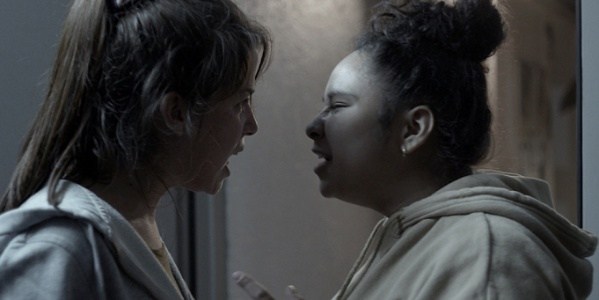
When I realised the dialogues weren’t written beforehand, it was a shock to me because there are some phrases that are so beautifully poignant that it doesn’t feel like they could have been improvised. Was there any moment in particular where you had to stop to take a breath?
Fred Baillif: When we shot the scene of Alison, you know, that very, very tough scene about her father raping her, we were all crying, all of us. I made sure this didn’t happen to her, but you don’t know… We really had to make sure nothing like that happened to her, with her father. And I really think the only thing I told her is to really take her time, she could get into details and everything, but she had to count to 10 between each sentence, which actually gave her a long time to think about what she was going to say and it gave us a lot of strong silences that we could use in the edit. That was the only thing I told her and it was just magical. The way she said it… It was just magical.
So my idea from the beginning was that I refuse to write dialogues, because I believe that, from their background, their reality, they will have much better dialogues than anything I could ever try to write. And they will also have a better way to express themselves. This was my technique and I am really happy that it worked with them.
There’s a moment when Alison says “I’m angry, but deep down is only sadness”. It was such a beautiful, beautiful scene, so raw, and your cinematography amplifies this sense of young women being pushed into adulthood much too early. Here, all is darkness except for a beacon of light that never leaves their faces. How did you work with your cinematographer to create this atmosphere?
Fred Baillif: Freedom, freedom everywhere. This is why I believe that they are co-writers of the film. I couldn’t shoot a film without a script, but I refused to have dialogues because I felt like they could not only deliver dialogues way better than me but also that they would feel free. They would bring ideas to the story that I have to listen to, things that I would not think about. So we were always open to anything that could help. When we were shooting, we would always make really long takes because they need to feel comfortable and, if you’re shooting for a really long time, they will forget that we are shooting and they will come up with ideas, propositions, they won’t feel the stress because they can’t be stressed for a full 20 minutes. The stress will go down after 10 minutes and then you can do your thing, you know where you are, you don’t have anxiety, which they didn’t because we trained them to be filmed and to improvise.
This is where the light comes from, you know, enjoy it, have fun, and we had a lot of fun adventures. We decided to shoot 360 degrees, which means that he is lighting up so we can shoot all around because we had to be ready for anything that could happen. Sometimes the whole house was lit because you never know what’s going to happen if they want to run away or, you know, play hide and seek. There’s freedom and it’s fun.
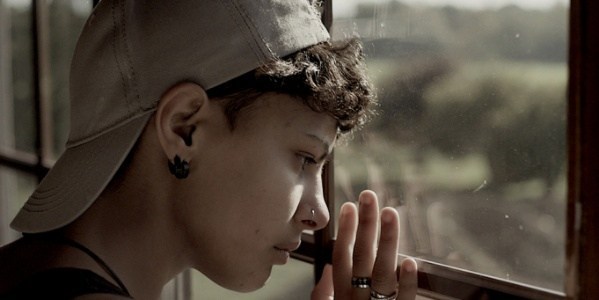
That sounds wonderful and it makes me wonder how much did you end up with? How was the editing process?
Fred Baillif: It was long and painful. Really. I had the first edit after six months, with two editors, and we had a film which was linear because the film that I wrote, in the beginning, was nonlinear, I had this idea of, you know, having chapters with a character and then we’d go back, but I was too afraid to go there. So we did a linear film, and it was okay. We had a screen test with a few friends and producers and they liked it. We all liked it. And then we had COVID and I said “Okay, let me re-edit everything”. So I went into my office and I have to thank my wife because it was day and night, sometimes I would get up at three in the morning with an idea “what if I switch this and that and I try that and we’ll see what it’s like”. I would go into the night and it was crazy, but a lot of fun.
As you said before, Claudia turned out to be such an incredible actress. How much did she bring to the table with over 30 years of experience in social work? How much did she contribute to the story?
Fred Baillif: The whole story of how institutions are afraid of taboos, how they become aggressive or oppressive with the children to protect them, all these things come from her experience. She was retiring when we started working and she told me how tired she was of dealing with board members and being checked by the police and all these things. Whenever there was a discussion or something about sex, it was always related to the law, it was not treated like it is in normal families, and she thought it was a problem. She gave me the subject of the film by telling me that. That was the first interview I made because I started all interviews with “what is your drama? What is your story? Tell me” and her drama, professionally, was this. So she inspired me.
When she had the scene with the board members, she was expressing her feelings. I told her “Look, this is your moment. Now you’re allowed to say everything that’s in your chest. Go ahead, have fun!”, and she did. And, to me, this is the best. Really, so strong.
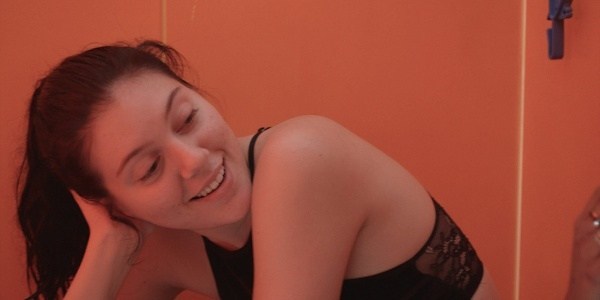
How was the experience of screening the film at a digital festival? This is a very raw, very emotional film, and I imagine you must crave the reaction of the audience.
Fred Baillif: Just like editing, it’s painful. It’s very frustrating because it’s my first time at such a big festival and it’s like a dream coming true and then I have to sit at home… We had a party with four people in my apartment, which was really, really sad, but I’m very optimistic that hopefully cinemas will open and we will have that. Not only for me but for the girls because they have absolutely no idea of what’s going on with the film right now. They think it’s cool, but they don’t know about Berlinale, you know what I mean?
They loved the film, they’re really, really proud. Just something I want to share with you: when we finished shooting, and I always get emotional when I talk about this, but it’s so important to me because this is what gives my work meaning. Of course, I’m making films because I love making films, I think I have something to say, I have my own technique and I want to succeed, but one of the reasons why I do this is for them, to help them.
On the last day of the shoot, everybody was crying, we were like “we did it! we did it!” and Kassia was so sensitive, you know, she cried. And so I asked her how she felt and she looked at me and said: “I’m very proud”. And the social worker was there, someone who met her when she was 12, and she said it was the first time she heard Kassia say she was proud of something. First time. So that for me is the reward because maybe we didn’t change them, but we are planting seeds and it will hopefully grow and they will gain a bit more confidence. So this is the sense of my work and I really believe, I really hope that they can be there when we screen the movie to an audience because they will receive a lot of love and they will understand that they have value.
What is your favorite film starred by non-actors? Let us know in the comments below!
La Mif/ The Fam screened at Berlinale 2021.
Film Inquiry would like to thank Fred Baillif for speaking with us.
Does content like this matter to you?
Become a Member and support film journalism. Unlock access to all of Film Inquiry`s great articles. Join a community of like-minded readers who are passionate about cinema – get access to our private members Network, give back to independent filmmakers, and more.
Join now!
